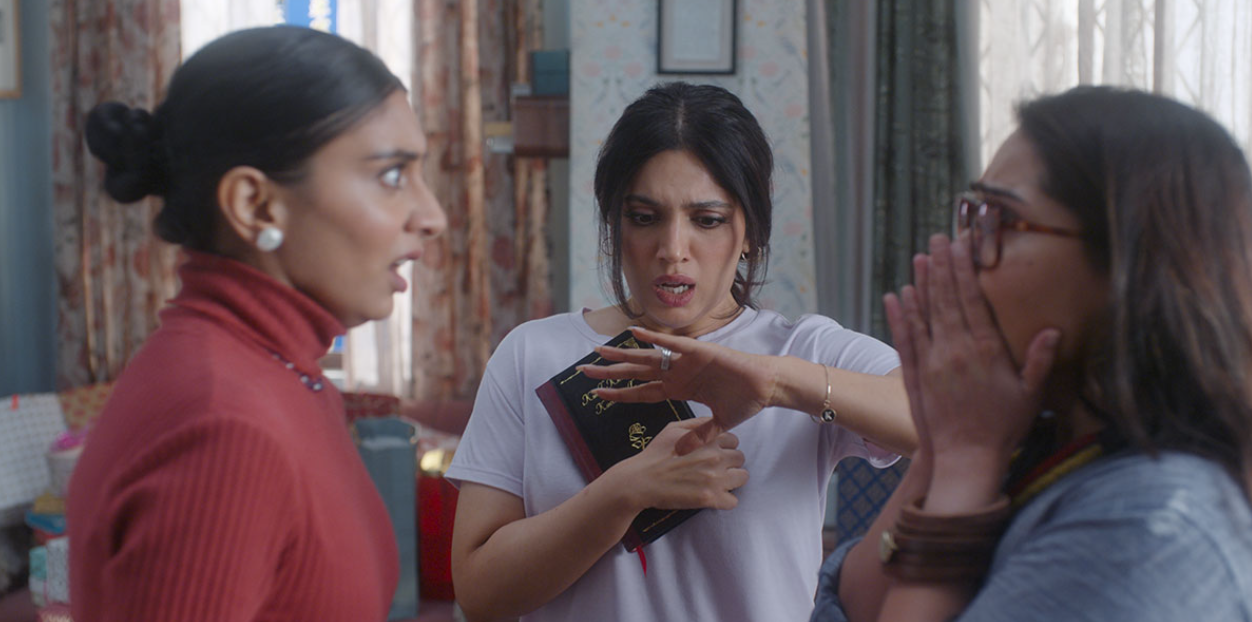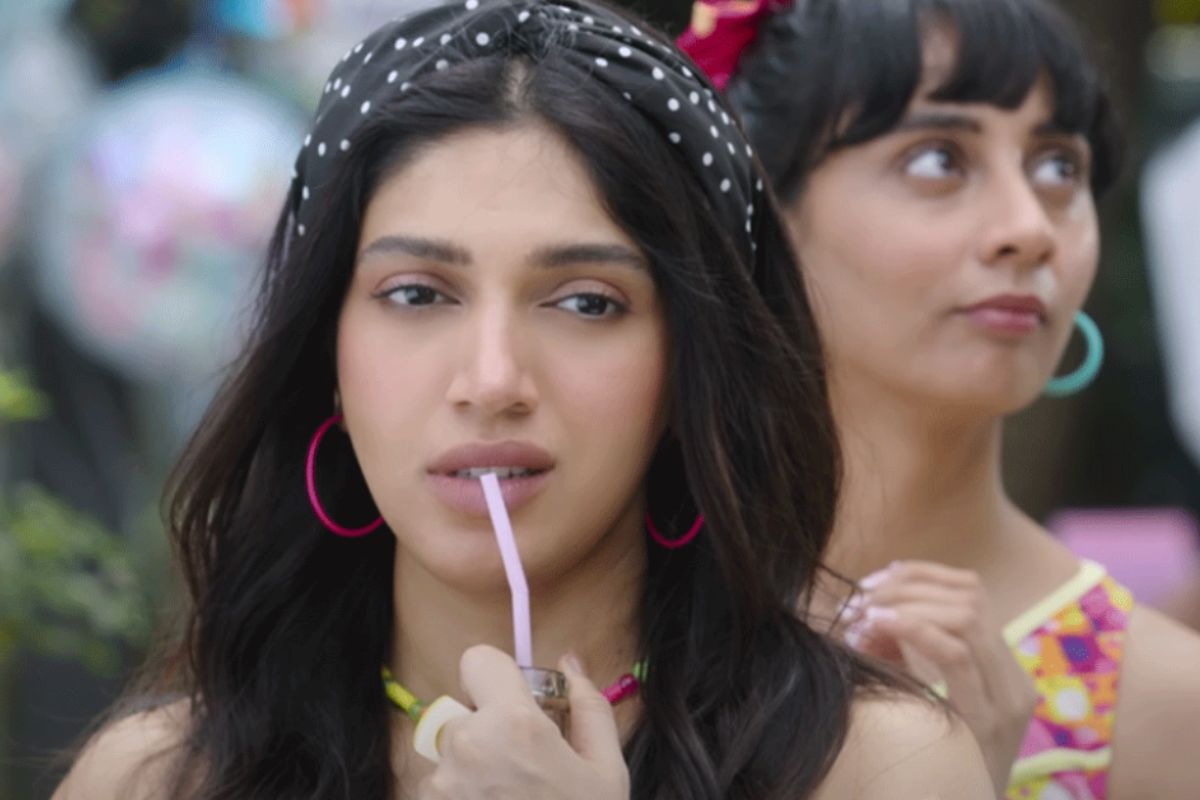Kanika Kapoor (portrayed by Bhumi Pednekar) is an unmarried woman in her middle years, and surprisingly, she has never experienced an orgasm. Quite early in the movie, it becomes evident that her actual life is far removed from the romantic tales she grew up hearing and watching, which were like fairytales. Kanika feels burdened by the societal expectations and gender stereotypes within the patriarchal society she resides in. She embarks on a quest to pursue the most basic of desires – pleasure.
Plot
In this movie, helmed by Karan Boolani, Kanika is portrayed to have engaged in intimate relationships with numerous incompatible partners, symbolically referred to as “kissing frogs,” yet she has never experienced an orgasm. She reveals this to her two female friends (who are shockingly always by her side), and it takes everyone by surprise. In her own words, her life, and thus the essence of the film, can be best described as a “bhasad waali fairy tale” (chaotic fairy tale). Since her teenage years, she has been on a quest to find the one because a “kunwaari” (unmarried) person can’t have a fairy tale alone. So, what is she seeking in her partner? Kanika boldly declares that she is looking for a love like Veer Pratap and passion like Sunny Leone.
She was brought up by her single mother, Bina (played by Natasha Rastogi), who is a gynecologist. As a result, discussions about sex are a regular occurrence in the Kapoor household, which often annoys Kanika’s grandmother (Dolly Ahluwalia). The older women hold contrasting opinions: Granny wishes for Kanika to find a life partner, while Bina advises her pleasure-seeking daughter to take matters into her own hands, figuratively speaking.

Driven by desperation, Kanika agrees to marry Jeevan Anand (played by Pradhuman Singh), a gentle and considerate owner of a hardware store who genuinely loves and respects her. However, it seems that empowered women are not typically drawn to kind-hearted men like him! Kanika asserts that marriage is merely a box to check off on a women’s checklist.
Next, following a series of poor decisions, Kanika wakes up the morning after her engagement party. She hastily agreed to marry the infatuated businessman Jeevan and then wakes up with both a hangover and the realisation that she has finally had an orgasm. However, she can’t remember who is responsible for her newfound happiness.
In the latter part of the film, Kanika attempts to retrace her inebriated journey from the party to her climax. The narrative dedicates varying amounts of screen time to her revisiting her past partners, which include Anil Kapoor and Sushant Divgikar. Through these encounters, she comes to understand the true nature of these relationships and begins to recognise her emotions for Jeevan.
What Works For The Film?
Noteworthy in the film is Kanika’s mother and her challenges as an unmarried woman. This subplot is intricately integrated into the story, and her interactions with Kanika are quite remarkable.
The writers, Radhika Anand and Prashasti Singh, deserve praise for crafting a character like Rahul and portraying how he transforms into a drag queen after dark. Witnessing Sushant Divgikr portray a transgender character in a mainstream film, embracing their identity and basking in their own brilliance in ‘Pari Hoon Main,’ is an absolute joy!

The costume team also deserves special recognition. ‘Thank You For Coming’ is a visually captivating film. Kanika’s engagement dance performance with her friends and former lovers, set to Ritviz and Nucleya’s ‘Baaraat’ in the background, is exceptionally breathtaking.
What Doesn’t Work?
Promoting inclusivity, diversity, and representation is currently a crucial and justified requirement. In recent years, the film industry has been making efforts to become a more inclusive and welcoming environment for people of all genders and ethnic backgrounds. When LGBTQ actors break through barriers and stand shoulder to shoulder with cis-gendered stars, it represents a significant milestone. However, just engaging in discussions about your sexual experiences with friends in an attempt to seem forward-thinking, and fashionable doesn’t suffice.
This is precisely why the film ‘Thank You For Not Coming’ falls short. While we support the idea of being open about sexuality, it’s important to recognise that in 2023, women are far more than just their relationships and sexual experiences with men. Their lives extend beyond complaining, gossiping, and discussing men, sex, and orgasms with their friends.
The second part of the film is a bit of a mishmash. It touches upon themes like women shouldn’t apologise for living life on their own terms, a young schoolgirl’s reluctance to wear a bra, and addresses the handling of a leaked MMS. The film also prominently promotes the notion of dismantling patriarchal norms. Halfway through the movie, you might find yourself lost in a narrative that seems to lack a clear direction or resolution.
Also, the message of the film remains somewhat unclear, and the resolution to Kanika’s problem is so absurd that it’s astonishing she didn’t figure it out until the age of 32, which is something most teenagers know!

Apart from this, in the movie, there are expendable characters who make sporadic appearances, such as a school rival (Kusha Kapila) and the supremely self-assured young woman Rushi (Shehnaaz Gill), who perhaps goes too far when she defines herself as “happiness.” Several inconsistencies in the plot may leave you puzzled, such as understanding Kanika’s identity beyond her sexual encounters and how she initially crossed paths with Jeevan.
Final Verdict:
‘Thank You For Coming’ makes a concerted effort to celebrate self-love and self-care but ultimately presents a superficial and distorted portrayal of feminism. This is disappointing because it simplifies and undermines the complexity of women’s lives.













